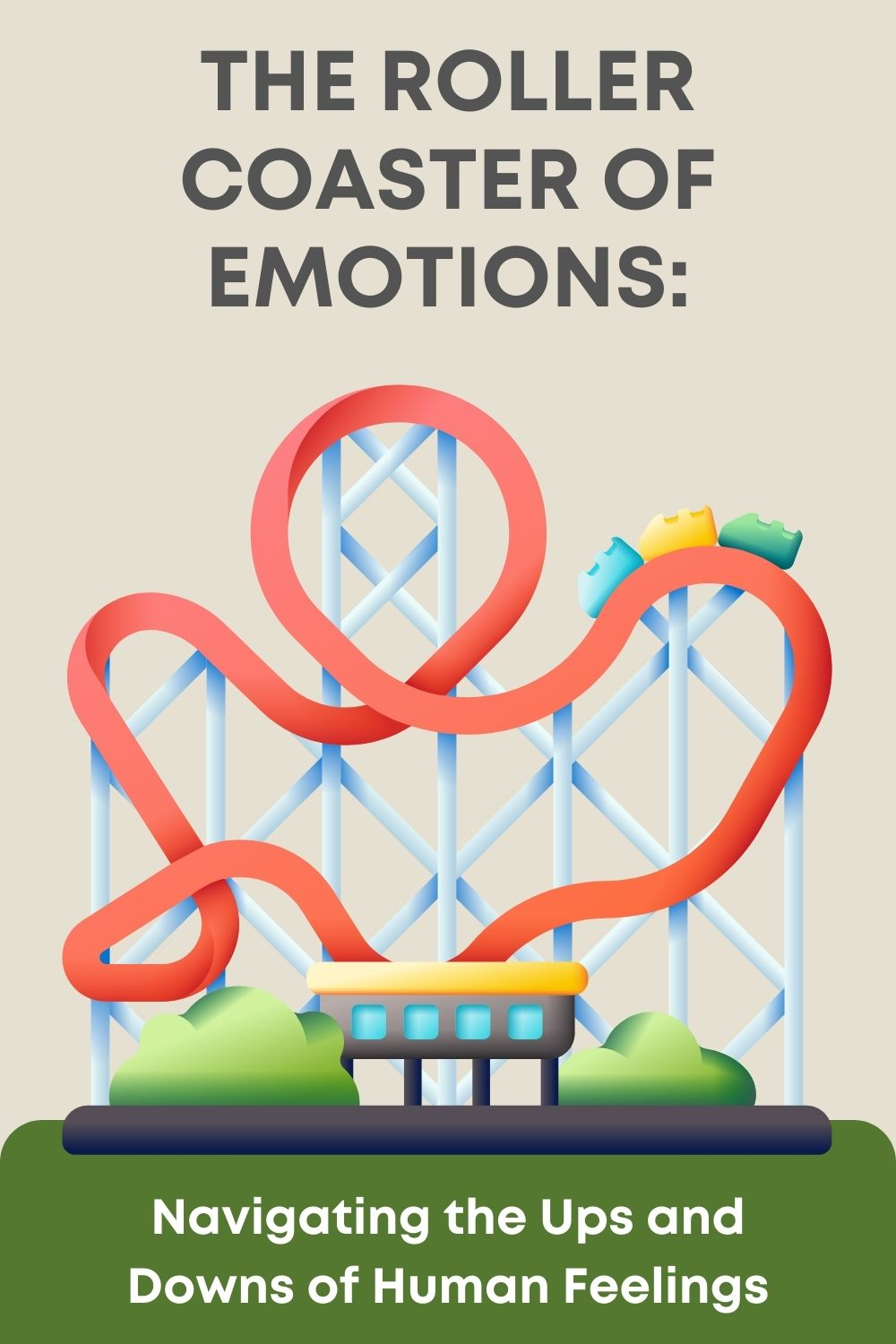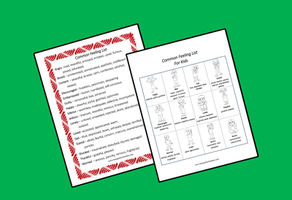
 We all have emotions, we feel them every day and we're usually grateful for them. However, some situations in life can cause them to spiral and that's how we end up on a rollercoaster of emotions.
We all have emotions, we feel them every day and we're usually grateful for them. However, some situations in life can cause them to spiral and that's how we end up on a rollercoaster of emotions.
If you feel like that's where you are right now, like you're on a never-ending ride of emotions and it's making you sick, you are not alone. Experiencing a rollercoaster of emotions can be extremely overwhelming for anyone, even us.
See, as Christians, we know that God is sovereign and in control but that does not stop us from feeling our emotions. We still feel it all, the only difference is that we know God is good and that He will eventually bring us through it.
Still, we can do things that make it easier to go through it until He brings us out. In this post, we'll talk about what an emotional roller coaster is, what causes it, and how we can use it to grow in our faith. We'll also discuss the connection between emotional rollercoasters and mental illness. In the end, you'll find a few coping strategies to help you through the ride.
So if you're ready to thrive through your roller coaster of emotions in everyday life, keep reading.

What is a Roller Coaster of Emotions?
A roller coaster of emotions is a bout of intense and fluctuating feelings at a certain point in time. It's characterized by extreme shifts in emotions, such as going from happy to sad, to nervous or mad in a matter of moments. The sudden shifts in feelings are what make it feel like an emotional roller coaster. It's like being on a real roller coaster, with sudden drops, sharp turns, and unexpected twists and turns.
This emotional phenomenon can be triggered by many different things such as stress, conflict, traumatic events, mental illness, and even life transitions. For example, losing something precious to you can make you feel sad, angry, and anxious at the same time. Struggling with mental illness can also cause intense emotional highs and lows that are often hard to control.
If you're feeling it right now, know that everyone goes through moments when their emotions feel out of control or hard to manage. The key is to develop practical coping skills to help you manage the way you feel during those moments. What Causes an Emotional Roller Coaster?
What Causes an Emotional Roller Coaster?
There are tons of different reasons people experience emotional roller coasters but stress is one of the most common causes. When faced with stressful conditions, our bodies produce cortisol, which is also known as the stress hormone.
Long exposure to cortisol causes negative emotions like anxiety, anger, and despair. Additionally, significant life changes like a divorce, the loss of a job, or the death of a loved one can also activate a roller coaster of emotions.
Another potential cause of an emotional roller coaster is a lack of emotional regulation skills. Emotional regulation is the ability to manage your emotions effectively. People who struggle with this feel intense emotions that they are unable to manage. This lack of control tends to cause a cycle of negative thoughts and actions, which can aggravate the roller coaster of emotions.
Finally, some people can undergo emotional roller coasters as a result of mental health conditions like bipolar disorder or borderline personality disorder. These illnesses can cause severe mood swings, from euphoria to depression. If you think your emotional roller coaster may be caused by a mental illness, it's important to seek professional help.
The Emotional Roller Coaster And Mental Illness
Due to the brain chemistry involved in mental illness, a person can experience huge changes in their emotional state, which can have a significant impact on their emotional well-being. This often leads to intense, and sometimes unpredictable emotions, like anxiety and irritability.
Living with a mental illness can be tough, especially when it comes to managing your emotions and maintaining your emotional well-being. If you struggle with mood disorders, you may find it hard to regulate your emotions, which in turn causes periods of intense emotional highs and lows. This can have a profound impact on your overall emotional well-being and your ability to function in your daily life.
It's important to remember, however, that experiencing a roller coaster of emotions doesn't necessarily mean you have a mental illness. Emotions are a natural part of being human, and it's normal to experience a range of feelings throughout life. However, if these emotions are impacting your daily life and ability to function, it may be worth seeking professional help to find out if you have an underlying mental health condition.
How Do You Use a Roller Coaster of Emotions?
As Christians, we can use the roller coaster of emotions to grow in our faith and draw closer to God. Instead of letting our emotions control us, we can take them to God in prayer and seek His direction and comfort. We can trust in His promises to us and know that He is here even in the midst of our most difficult emotions.
One practical way to use the roller coaster of emotions is to journal about them. Writing down your thoughts and feelings can give you insight into what might be causing them.
You can then take your journal to God in prayer and ask Him to show you any areas of your life that need healing or growth.
How to Cope with a Roller Coaster of Emotions? 12 Ways to Cope
You may be experiencing a roller coaster of emotions but you don't have to suffer through it. Here are a few ways to cope with your roller coaster of emotions:
Pray & Read
Pursue a greater sense of peace and guidance through prayer and immersing yourself in God's Word. Open your heart and seek God's presence, asking for His peace, comfort, and wisdom during challenging emotional times. Embrace the power of prayer as a means to connect with God and find solace in His loving presence. One way to pray when experiencing a intense emotions is to pray scripture back to God.
Additionally, engage in reading the Bible has many benefits. Reading the Bible allows its words to serve as a constant reminder of God's unwavering promises, unconditional love, and steadfast faithfulness. The Scriptures can provide profound insights, encouragement, and guidance, helping you navigate the rollercoaster of emotions with a renewed sense of hope and spiritual strength.
Journal
Writing down your thoughts and emotions is a helpful way to process them. You can write out your prayers, record how you feel, and look back on your experiences. You can check out our article on a beginner's guide to journalling and a list of Christian journalling ideas. )-(3).jpg)
Seek Support
Reach out to a trusted friend, family member, or pastor for help when you need it. God created us to build each other up. There's someone around you who wants to do just that, let them.
Practice Self-Care
Incorporating self-care into your life is vital. Prioritize tending to your physical, emotional, and spiritual well-being. Opt for regular exercise, nourish your body with wholesome food, ensure you get sufficient rest, embrace the healing power of nature, and engage in activities that truly bring you joy.
Embrace The Emotions
Allow yourself to feel your emotions without judgment or shame. It is totally fine to feel sad, angry, or anxious. Accepting how you feel is the first step to managing your emotions.
Embracing and accepting your emotions is the initial step towards effectively managing them. By acknowledging and honoring your feelings, you can gain a deeper understanding of yourself and begin the process of emotional healing and growth. Remember, your emotions are valid and worthy of your attention.
Trust in God's Plan
Remember that God has a plan for your life and that He is with you through it all. Trust in His sovereignty, and know that He will never leave you or forsake you.
Find Creative Outlets
Music, art, dancing, or writing can help you express your emotions in a healthy way and get off an emotional rollercoaster. Use them for your benefit as well as the benefit of others.
Be Mindful
By being present and aware, you can detach from strong emotions and gain perspective. Observe your emotions without judgment, focusing on the present moment. Recognize that emotions are transient and not defining. Gain a broader perspective and make conscious choices in how you respond. Cultivate mindfulness through practices like breathing exercises and guided meditation. With time, you'll navigate emotions with greater ease and find inner calm.
Cultivate a Positive Mindset
Cultivating a positive mindset can help you approach the emotional roller coaster with more optimism and resilience. By focusing on hope and positive affirmations, you can shift your view on things and find strength in the face of challenges.
Be Grateful
Being grateful can help you cultivate a sense of joy and contentment in the midst of an emotional roller coaster. By focusing on the blessings in your life you will build resilience and feel better.
Develop Coping Strategies
Developing coping strategies can help you navigate the highs and lows of an emotional roller coaster. These strategies include prayer, deep breathing exercises, visualization, positive self-talk, and more. Developing even one good coping strategy will make all this difference.
Seek Professional Help
If your emotions are too overwhelming or they begin to interfere with your daily life, seek help from a mental health professional or counselor. A trained therapist can help you develop coping strategies that work and identify underlying issues, plus they can provide the tools you need for managing intense emotions. You can find a Christian counselor near you by search out database here.
Final Thoughts on Experience A Roller Roaster of Emotions
Experiencing a roller coaster of emotions is challenging, but it's also a normal part of the human experience. Acknowledging and validating your feelings, both positive and negative is vital in this situation. Instead of trying to suppress or ignore your feelings, take time to understand and accept them.
Remember that you are never alone, and there is no shame in seeking help from friends, family, or a mental health professional. Do not let fear or stigma prevent you from getting the help you need. With God on your side and a few coping strategies in your arsenal, you can and will ride the waves of emotions and come out stronger on the other side.
Before you leave, we would appreciate it if you helped us spread the word by sharing, tweeting, pinning, etc. this post.
About the Author:
 Corine Williams, Ph.D. is Clinical Psychologist that is currently seeing clients in the States of Maryland, New Jersey, and New York. You can find out more about her practice by visiting www.therapyforchristians.com/corinewilliams. In addition to providing individual therapy, Dr. Williams is also passionate about writing books and designing merchandise that educate, uplift, and normalize mental health subject in the Christian community. You can find out more about her at www.booksbycorine.com or by visiting her amazon profile here: https://www.amazon.com/Corine-Hyman/e/B00AWZ5FL2
Corine Williams, Ph.D. is Clinical Psychologist that is currently seeing clients in the States of Maryland, New Jersey, and New York. You can find out more about her practice by visiting www.therapyforchristians.com/corinewilliams. In addition to providing individual therapy, Dr. Williams is also passionate about writing books and designing merchandise that educate, uplift, and normalize mental health subject in the Christian community. You can find out more about her at www.booksbycorine.com or by visiting her amazon profile here: https://www.amazon.com/Corine-Hyman/e/B00AWZ5FL2
Help us increase mental health awareness in the Christian community by donating through our paypal link here: www.paypal.com/therapyforchristians, joining our mailing list by clicking below, or join our provider list here: Provider listing
Disclaimer: the information, including but not limited to, text, graphics, images and other material contained on this article are for informational purposes only. No material on this site is intended to be a substitute for professional medical advice, diagnosis or treatment. If you are looking for a Christian counselor near you, please check out our directory located here: Christians Therapist Near Me
.png)














